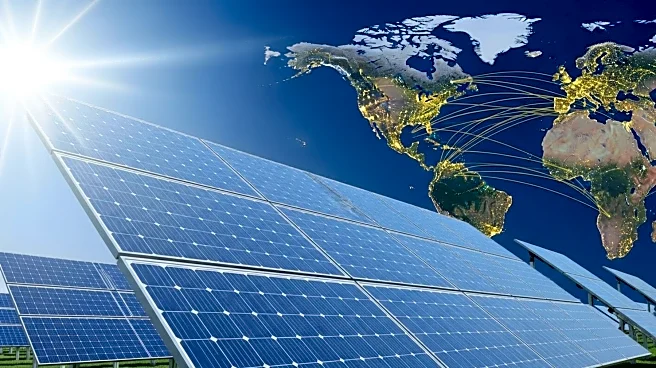What is the story about?
What's Happening?
Chinese companies have significantly increased their overseas investments in green technology manufacturing, according to a report by the Net Zero Industrial Policy Lab at Johns Hopkins University. Since 2022, these companies have committed over USD 210 billion to green tech projects, which accounts for approximately 88% of the total investments recorded since 2011. The investments span 461 projects across 53 countries, focusing on batteries, electric vehicles, charging infrastructure, green hydrogen, solar panels, and wind turbines. Southeast Asia remains the largest recipient of these investments, but the Middle East and North Africa have captured over 20% of new deals in 2024. Indonesia leads in nickel and cobalt projects, while Morocco and Egypt are emerging as bases for cathodes and green hydrogen production.
Why It's Important?
The surge in Chinese investments in green technology manufacturing is reshaping global supply chains, particularly in emerging markets. This expansion offers these markets opportunities to integrate into global supply chains, potentially boosting their economic growth and technological capabilities. However, the report highlights vulnerabilities such as geopolitical tensions, tariffs, and sanctions that have led to project delays or cancellations. Additionally, there are concerns about overcapacity risks in China's green tech sectors and mounting trade restrictions. These developments could influence international competition, as other countries may respond with subsidies and standards to protect their own industries.
What's Next?
The report suggests a potential slowdown in investments from the 2024 peak due to geopolitical headwinds. Companies are adopting 'light-asset' strategies to maintain market access, allowing local firms to use Chinese manufacturing equipment or produce under Chinese brands. Industrial analysts warn of intensifying international competition and trade restrictions, which could impact future investments and project viability. Countries receiving these investments may need to navigate these challenges to fully benefit from the integration into global supply chains.
Beyond the Headlines
The expansion of Chinese green tech manufacturing overseas raises ethical and strategic questions about dependency on Chinese technology and the potential influence China may exert over global green tech markets. As countries integrate into these supply chains, they must consider the long-term implications of relying on Chinese investments and technology, including potential shifts in geopolitical power dynamics and trade relationships.

















